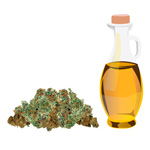IPM, or Integrated Pest Management, is a way to combat pests with living predators. A new study has made a relationship between the use of products against pests in fruits and vegetables, with female fertility. The last October 30th CNN publish a new explaining readers about another study alerting about risks of consuming products treated with pesticides. It's not a new story, the exposure to pesticides could had harmful effects for health. How many times did we hear that already? Seems not enough. At SantYerbasi we are for responsible farming, and can not stop pointing this. There is a never-ending list of reasons to go for organic products in our gardens, stop using synthetic products replacing them for Integrated Pest Management pest controllers.
Agro-synthetic products and risks for health
The study referred noticed by CNN was published by JAMA (Journal of the American Medical Association). Researchers found that, compared with women that ate less daily amount of fruits and vegetables with high content of pesticides, the ones that ate 2,3 portions or more had a 18% less probabilities of getting pregnant, and a 26% more probabilities of loosing the baby along pregnancy or birth, and THAT'S A LOT!
The use of pesticides in crops (those substances used to remove pests, molds, fungi, predators, insects or harmful herbs) implies a human consumption, to which many illnesses are associated (like memory disorders, depression, abortion, cancer or neurological illness). Besides its consumption, its manipulation is also dangerous. Some studies demonstrated that exposure to pesticides could cause chronic breathing problems, and skin illness. Even though, pesticides are not the only substance that cause damages. Synthetic fertilizers and agro-chemical products in general are harmful.
Maybe we forgot for some time, but there are many options to substitute synthetic products. Human being has used Integrated Pest Management against pests almost since early days of growing. This natural method, based in introducing alive species fed by harmful species. It is so effective against pests, and non aggressive for plants.

Why moving to Integrated Pest Management
Pesticide free crops. As we previously said, its been demonstrated that inhaling and eating agro-synthetic products increase the risks of suffering chronic illnesses. In the case of cannabis growing, what we pretend is getting a healthy and clean product, full of beneficial properties with a pure taste, not altered by the taste some synthetic products remaining in plant.
Effectivity. With the pass of time, most of the pests had developed defenses against synthetic pesticides. These are less effective and nowadays some species are inmune to most common pesticides.
Biodiversity. Pesticides kill everything, no matter beneficial or harmful species, what causes an environment inbalance. Predator insects are basic to keep pests apart.
Ecology. Synthetic control of pests brings together toxic filtrations, which are highly contaminant growing outdoors. These filtration penetrate in ground and contaminate surrounding areas, removing all microbial life and making the substrate susceptible to harmful pathogens. In addition, insects, amphibians, birds and mammals could be affected. Once this toxicity affects a specie, it propagates along all the alimentary chain affecting bigger mammals and humans.
Handling without risks. Pesticides are designed to kill. Handle or exposure to them repeatedly has a high damage. World Health Organization estimates that every year 3 million cases of pesticide toxic exposure are noticed, causing 220.000 deaths cases.
Budget savings. With Integrated Pest Management you'll save a lot of money invested in pesticides and application costs.
IPM strategies
There are three main strategies to biologically control pests: Importing, increasing and conservation. Importing consists in introducing in your environment the natural enemies of the pests to combat; the increasing, as its name tells, is produced when we add or propagate an amount of predators higher than it would produce in its natural way; and conservation is based in improving the environment to promote the beneficial insects population development.
In cannabis growth, importing is the most common way for biological control, as many predators are not produced in the growing environment (specially when growing indoors). Even though, once the predator population of beneficial insects are in, there are other techniques that help improving.
There are many predators able to control typical pests in cannabis gardens. Ladybugs, lacewings, predator bedbugs, some predator mites like phytoseiulus persimilis and amblyseius californicus, encarsia formosa, parasite wasps and little nematodes, could become your best allies. You won't need synthetic products to keep pests apart if you invite these hosts to your garden.
Stop using chemicals
We won't stop telling you, the key for a healthy growth is a balanced substrate. Fungi, bacteria and beneficial organisms help us regulating those are not, remove their harmful effect and naturally control mites, harmful fungi and pests without needing pesticides.
Even though, we know it, this is not easy. The balance is fragile, firsts insects appear, and we begin shaking. Keep calm, these are the steps to follow when you notice the first symptoms:
Identify invaders
- Are there many or few? Larvae or adults? Evaluate the propagation and stage in which pest is.
- Get the suitable predator to combat them.
- Be sure that chosen predator is compatible with other beneficial insects living in the environment.
- Once predators introduced, check them. Are they doing their function? Have they integrated in the environment?
- Do not worry too much if you still see some invaders. Remember that balance is the key. Beneficial organisms will need to be fed if you don't want them to go away (or killing each other).

Now it's time to get rid of synthetics and change to Integrated Pest Management. Do you still need more reasons?
Sources
https://www.ncbi.nlm.nih.gov/pmc/articles/PMC2610108/
http://edition.cnn.com/2017/10/30/health/pesticides-in-food-fertility-study/index.html
https://www.marijuana.com/news/2016/08/grow-guide-biological-pest-control/
https://www.leafly.com/news/cannabis-101/organic-pest-control-cannabis-home-growers
https://depts.washington.edu/ceeh/downloads/FF_Pesticides_SP.pdf
Did you like this post? Feel free to share it with your friends in social media
If you are interested in more articles maybe you like these ones:




